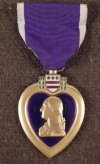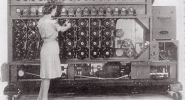On this date, 7 August 1782, George Washington ordered the creation of a Badge of Military Merit to be awarded to Continental Army soldiers:
"The General ever desirous to cherish virtuous ambition in his soldiers, as well as to foster and encourage every species of Military merit, directs that whenever any singularly meritorious action is performed, the author of it shall be permitted to wear on his facings over the left breast,
the figure of a heart in purple cloth, or silk, edged with narrow lace or binding. Not only instances of unusual gallantry, but also of extraordinary fidelity and essential service in any way shall meet with a due reward. Before this favour can be conferred on any man, the particular fact, or facts, on which it is to be grounded must be set forth to the Commander in chief accompanied with certificates from the Commanding officers of the regiment and brigade to which the Candadate [
sic] for reward belonged, or other incontestable proofs, and upon granting it, the name and regiment of the person with the action so certified are to be enrolled in the book of merit which will be kept at the orderly office. Men who have merited this last distinction to be suffered to pass all guards and sentinals which officers are permitted to do. The road to glory in a patriot army and a free country is thus open to all. This order is also to have retrospect to the earliest stages of the war, and to be considered as a permanent one."

The badge was the only award of merit in the Continental Army and was only awarded three times. After the Revolution, the award fell into disuse and was largely forgotten.
Following WWI, it was realized that there was a serious lack of medals available to US soldiers, so the Army, in 1932, re-instituted the medal “awarded to persons who, while serving in the Army of the United States, perform any singularly meritorious act of extraordinary fidelity or essential service.” Additionally, "A wound, which necessitates treatment by a medical officer, and which is received in action with an enemy of the United States, or as a result of an act of such enemy, may…be construed as resulting from a singularly meritorious act of essential service.”
With the outbreak of WWII, from 1942 onward, the award, commonly known as "The Purple Heart" has been exclusively awarded to those killed or wounded in action.

The new version was metal and included a bust of its creator.
It is estimated that, since 1942, 1.8 million have been awarded.

armyhistory.org
















